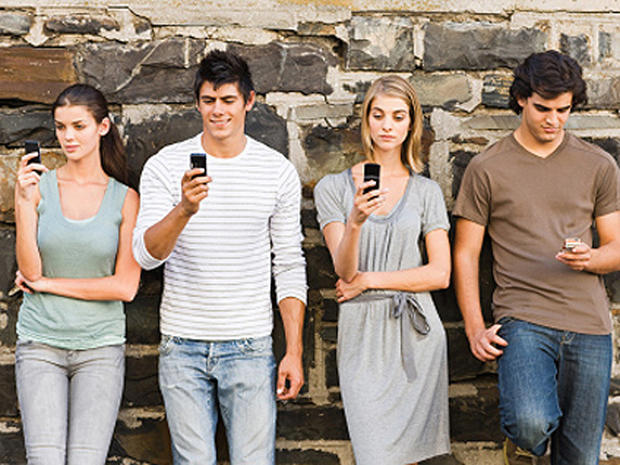One in four teens admit to sexting, study finds
(CBS News) It may come as no surprise that teens who "sext" may be more likely to engage in sexual behaviors. However, new research is showing that teens who are asked to sext - regardless if they agree to or not - are more likely to have had sex.
According to new research published in the Archives of Pediatric & Adolescent Medicine in July 2012, one-fourth of teens admitted to having sent a sext. And, 76.2 percent of teens who were asked to send a sext, even if they don't agree to do it, admitted to having had sexual intercourse, compared to only 38.2 percent of teens who had not been propositioned.
Teens keen on sexting racy photos? What new studies show
"Given its prevalence and link to sexual behavior, pediatricians and other tween-focused and teen-focused health care providers may consider screening for sexting behaviors. Asking about sexting could provide insight into whether a teen is likely engaging in other sexual behaviors (for boys and girls) or risky sexual behaviors (for girls)," the authors wrote.
Rates on the amount of teens who participate in sexting - which the study defines as the practice of electronically sending sexually explicit messages or images from one person to another - have ranged from 1 percent to 31 percent in various studies.
Researchers asked 948 teens - 55.9 percent of which were female - who were enrolled at seven public high schools in Texas and were between the ages of 14 to 19 if they ever sent naked pictures of themselves, if they had ever been asked to send a naked picture, if they asked someone to send a naked picture and how bothered they were by the request.
The results showed that over one-fourth of the teens admitted to sending a sext, but more girls (68.4 percent) were asked to send a sext more than boys (42.1 percent). Teens between the ages of 16 and 17 were more likely to be propositioned for a sext, and the requests declined in those 18 and older.
Boys were more than twice as likely to ask for a sext than girls, and girls were nine times more bothered by someone asking them for a sext than their male counterparts.
Overa;;. Ninety-three percent of girls and 90 percent of the boys said they had started dating, and 51.1 percent of girls and 54.6 percent of boys said they had sexual intercourse. Boys were slightly more likely to have sex with more than one partner in the last year than girls. In addition to the finding that those being propositioned were more likely to have sex, 95.7 percent of the sexually active teens were not bothered with being asked for a sext. About 77 percent of girls who reported having sent a sext also admitted to having sex, compared to 42 percent of girls who hadn't sexted. When it came to boys, 81.8 percent who had sexted said they had had sex, compared to 45.4 percent of boys who hadn't.
"Based on several informal conversations with counselors, teachers, parents, and students, I was actually surprised it wasn't a bit higher," Dr. Jeff R. Temple, a psychologist and assistant professor at the University of Texas Medical Branch at Galveston, told HealthDay.
He stopped short of making a judgment of whether or not sexting is bad for minors.
"Other than the potential for harassment when the pictures are disseminated or the potential for legal troubles, I don't think we have an answer," Temple said. "While we found that sexting may be a reliable indicator of sexual behavior, we cannot say if sexting preceded or followed sexual behavior, and we definitely cannot say it caused a teen couple to have sex."
